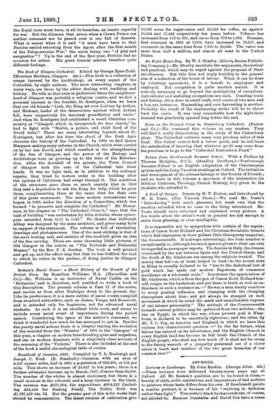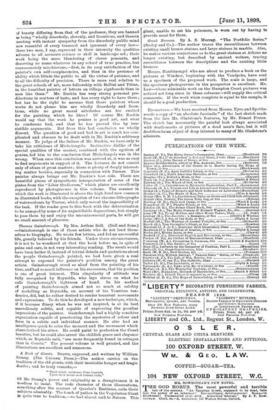ART-BOOKS.
Lectures on Landscape. By John Ruskin. (George Allen. 42a.) —These lectures were delivered twenty-seven years ago at Oxford. All Mr. Ruskin's qualities are to be found in them,— beauty of style, noble aspirations, and imputations of bad motives to painters whose taste differs from his own. If Rembrandt paints a sombre portrait, it is because of his "rejoicing in darkness rather than light." Tintoretto's black backgrounds are, of course, not alluded to. Because Constable and David Cox have a sense of beauty differing from that of the professor, they are banned as being "wholly disorderly, slovenly, and licentious, and therein meeting with instant sympathy from the disorderly public mind now resentful of every trammel and ignorant of every law— these two men, I Bay, represent in their intensity the qualities adverse to all accurate science or skill in landscape art ; their work being the mere blundering of clever peasants, and deserving no name whatever in any school of true practice, but consummately mischievous,—first, in its easy satisfaction of the painter's own self-complacencies, and then in the pretence of ability which blinds the public to all the virtue of patience, and to all the difficulty of precision. There is more real relation to the great schools of art, more fellowship with Bellini and Titian, in the humblest painter of letters on village signboards than in men like them." Mr. Ruskin has very strong personal pre- dilections in matters of taste, and has every right to have them; but has he the right to assume that those painters whose works do not please him are wholly disorderly and licen- tious, while no great moral attributes are too exalted for the painting which he likes ? Of course Mr. Ruskin would say that the work he praises is good art, and what he condemns bad, and that he has proved this by irre- sistible arguments. But from this last conclusion we wholly dissent. The question of good and bad in art is much too com- plicated and obscure to be dealt with in Mr. Ruskin' s arbitrary manner To judge of the failure of Mr. Ruskin, we have only to take his criticisms of Michelangelo. Instinctive dislike of the special qualities of the master, combined with the egotism of genius, led him to the conclusion that Michelangelo was in the wrong. When once this conclusion was arrived at, it was as easy to find arguments in support of it. The lectures do not consist only of abuse of great masters ; there is plenty of deeply interest- ing matter besides, especially in connection with Turner. This
painter always brings out Mr. Ruskin's best side. There are beautiful pieces of sympathetic interpretation of some of the plates from the "Liber Studiorum," which plates are excellently reproduced by photogravure in this volume. The manner in which the work is illustrated is above the high level now common in illustrated books, with the exception of two chromo-lithographs of water-colours by Turner, which only reveal the impossibility of the task. If the reader goes to this book with the determination to be annoyed by none of its unjustifiable dogmatisms, but simply to pass them by and enjoy the uncontroversial parts, he will get no small amount of pleasure.







































 Previous page
Previous page